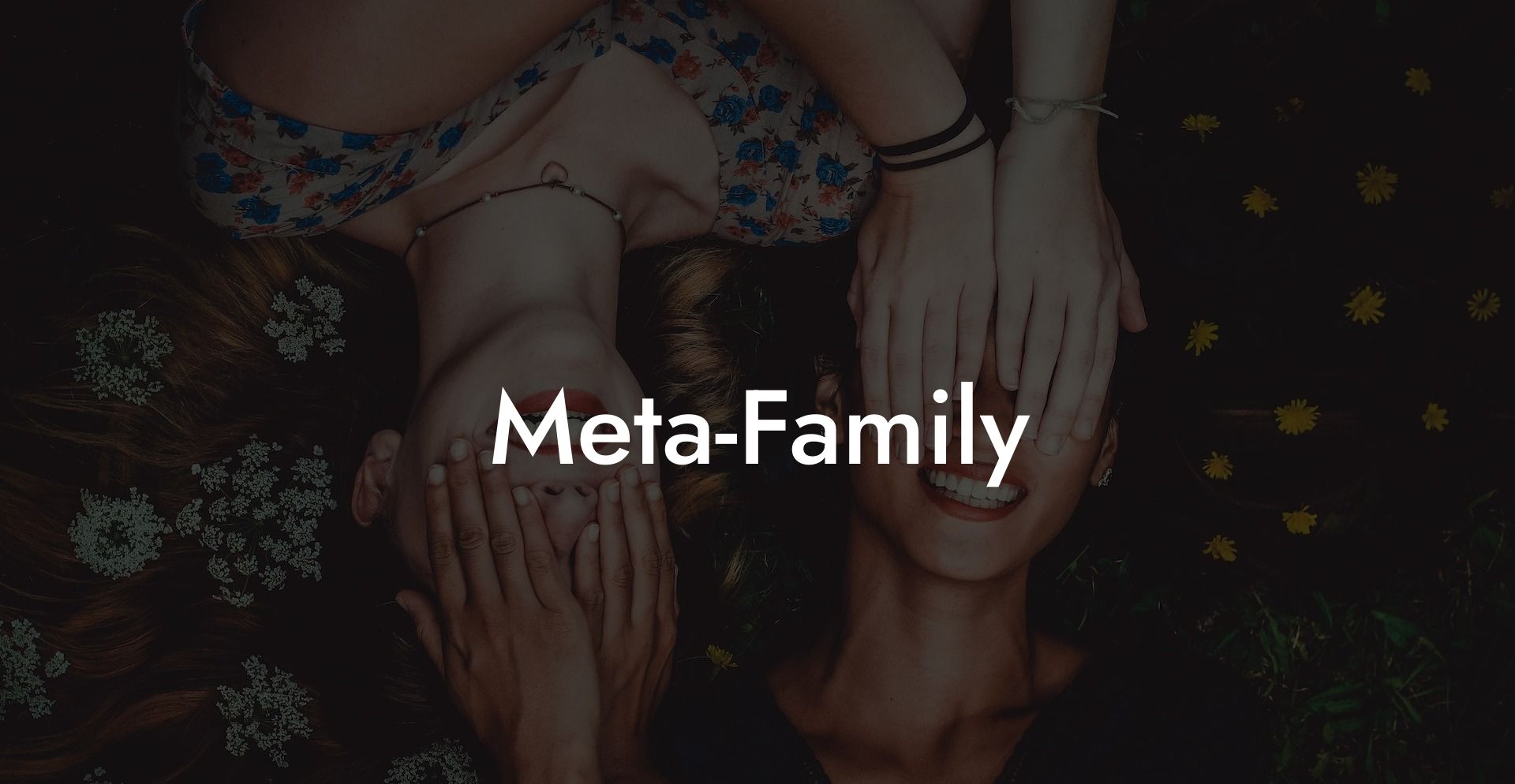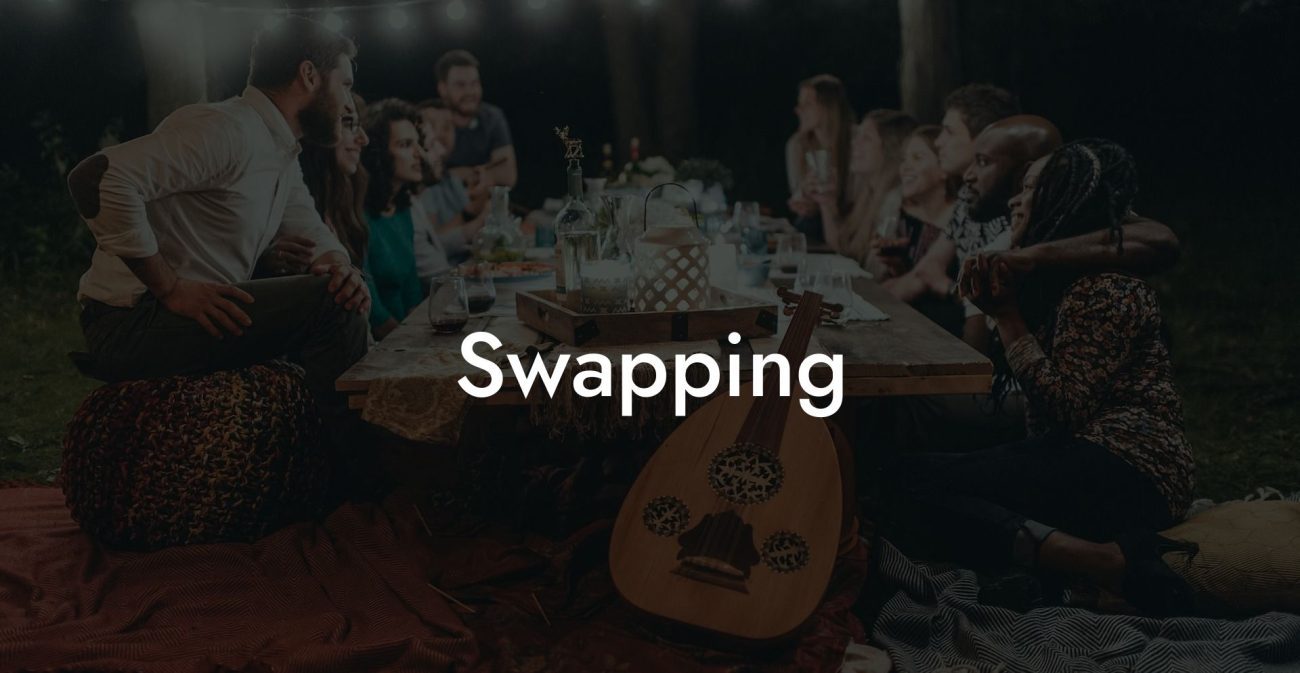Meta-Family

Imagine a family that isn’t bound by bloodlines or traditional definitions, but by deep, chosen connections that extend across every facet of your life—a community that supports, nurtures, and evolves with you. Welcome to Meta-Family, a groundbreaking concept in ethical non monogamy that redefines kinship. In a Meta-Family, love and support transcend conventional boundaries, creating a vast network of chosen relationships that function as a resilient, caring clan. Whether you’re forging deep romantic bonds, cultivating strong friendships, or blending both into a collaborative community, Meta-Family celebrates the idea that family is what you make of it, built on mutual respect, shared experiences, and collective growth.
Have you ever wondered if monogamy is just a stupid little experiment? Open relationships, polyamory, relationship anarchy...find out which relationship dynamic suits you best with our one minute relationship test. See if you are just conforming to "societal norms". Reveal your truth >>
Quick Links to Useful Sections
- The Ethical Non Monogamy Term: Meta-Family
- What Is Meta-Family?
- Core Principles of Meta-Family
- Historical and Cultural Perspectives on Meta-Family
- From Traditional Bloodlines to Chosen Communities
- Cultural Shifts in Modern Relationships
- Everyday Dynamics of Meta-Family
- Building Your Chosen Network
- Navigating Group Dynamics and Individual Autonomy
- Benefits of Embracing Meta-Family
- Enhanced Emotional Security and Support
- Personal Growth and Empowerment
- Improved Communication and Conflict Resolution
- Collective Resilience and Community Empowerment
- Challenges of Meta-Family
- Managing Complex Group Dynamics
- Balancing Personal Autonomy with Collective Expectations
- Navigating External Judgment and Societal Norms
- Frequently Asked Questions (FAQ)
- Resources and Community Support: Your Next Steps
The Ethical Non Monogamy Term: Meta-Family
What Is Meta-Family?
Meta-Family is a relational model within ethical non monogamy that expands the traditional concept of family. Instead of being limited to biological or legal ties, Meta-Family is formed by individuals who consciously choose to support one another through emotional, practical, and sometimes even financial connections. It is a network where every member is both an individual and part of a larger, interdependent community—an extended family created through shared values, experiences, and love.
In a Meta-Family, partners, friends, and chosen kin come together to form a support system that is flexible, inclusive, and dynamic. This model encourages continuous communication, collaborative decision-making, and a commitment to mutual growth, ensuring that every relationship contributes to the overall strength and resilience of the collective.
Core Principles of Meta-Family
- Chosen Kinship: Family is defined by connection and commitment, not by genetics or legal status. Every member is chosen for their unique contribution to the community.
- Collective Support: Meta-Family operates as a robust support network where emotional, social, and practical needs are met through shared care and responsibility.
- Inclusive Communication: Open and transparent dialogue is essential to nurture trust and understanding within the group.
- Mutual Empowerment: Every member’s growth and happiness uplifts the entire family, creating an environment of collective empowerment and shared strength.
- Adaptive Boundaries: Relationships evolve over time. Meta-Family encourages regular renegotiation of boundaries to reflect the changing needs of each individual and the community as a whole.
- Holistic Integration: Emotional, practical, and even spiritual aspects of connection are woven together to form a comprehensive support system.
- Resilience Through Unity: The strength of the Meta-Family lies in its interconnectedness—when one member thrives, the whole community benefits, and challenges are met together.
Historical and Cultural Perspectives on Meta-Family
From Traditional Bloodlines to Chosen Communities
For generations, family was often defined by birth and legal ties—a narrow framework that sometimes excluded those who did not fit conventional norms. In many traditional societies, kinship was fixed, and deviation from the established model was met with resistance. However, the advent of social revolutions in the 20th century, including the sexual revolution, feminist movements, and the emergence of polyamorous practices, paved the way for a broader understanding of kinship.
Early advocates of ethical non monogamy began to challenge the idea that family must be limited to biological or legal relationships. They observed that deep, supportive bonds could be formed through choice and shared experience. This shift in perspective gave rise to the concept of Meta-Family—a flexible, inclusive model that honors the diversity of human connection and redefines what it means to be family.
Cultural Shifts in Modern Relationships
In today’s globalized and digitally connected world, the concept of Meta-Family resonates strongly with individuals seeking authentic, supportive communities. Millennials and Gen-Z, in particular, are redefining the idea of family by embracing relationships that are chosen rather than imposed. Online communities, social media groups, and progressive relationship podcasts have all contributed to spreading the idea that family can be an expansive, dynamic network of chosen kin.
Modern narratives emphasize that the strength of our connections lies not in the labels we inherit, but in the bonds we actively build. Meta-Family champions the belief that emotional support, shared responsibility, and collective care are the true markers of a family, empowering individuals to create communities that reflect their values and aspirations.
Everyday Dynamics of Meta-Family
Building Your Chosen Network
Living in a Meta-Family means intentionally cultivating relationships that extend beyond traditional romantic partnerships. It involves:
- Regular Group Gatherings: Host communal meals, game nights, or casual hangouts that allow all members to interact and strengthen their bonds.
- Collaborative Projects: Engage in activities such as community service, creative projects, or even cohabitation arrangements that foster a sense of shared purpose and mutual support.
- Digital Connection: Use group chats, shared calendars, and online forums to stay connected, especially when physical distance is a factor.
- Open Dialogues: Schedule regular check-ins and feedback sessions where everyone can discuss their needs, set boundaries, and celebrate successes together.
Navigating Group Dynamics and Individual Autonomy
Balancing the collective needs of the Meta-Family with your personal independence is key to maintaining harmony. This involves:
- Individual Check-Ins: In addition to group meetings, have one-on-one conversations with key members to ensure personal needs are acknowledged.
- Flexible Boundaries: Recognize that your own emotional needs may evolve, and be open to renegotiating your role within the community as needed.
- Respect for Privacy: While fostering close bonds, maintain clear boundaries that respect individual privacy and autonomy.
Benefits of Embracing Meta-Family
Enhanced Emotional Security and Support
One of the most profound benefits of Meta-Family is the sense of security that comes from being part of a supportive, interconnected network. Knowing that you have a group of chosen kin who are invested in your well-being can provide comfort during challenging times.
- Robust Support System: The collective care within a Meta-Family creates a safety net that offers emotional, social, and practical assistance when needed.
- Deepened Trust: Regular, honest communication and shared experiences build trust, ensuring that every member feels valued and understood.
Personal Growth and Empowerment
Being part of a Meta-Family fosters a strong sense of individual empowerment. As you contribute to the collective, you also gain insights into your own strengths, desires, and areas for growth.
- Self-Awareness: Continuous interaction and reflection within the community help you discover more about your true self.
- Empowerment Through Collective Wisdom: The shared experiences and diverse perspectives of your chosen kin can inspire personal breakthroughs and drive individual empowerment.
Improved Communication and Conflict Resolution
The foundation of a strong Meta-Family lies in open, transparent dialogue. Regular group and individual conversations help prevent misunderstandings and enable constructive conflict resolution.
- Proactive Dialogue: Consistent check-ins ensure that issues are addressed before they escalate into major conflicts.
- Empathetic Listening: Open communication fosters a culture of empathy, making it easier to navigate disagreements and find mutually beneficial solutions.
Collective Resilience and Community Empowerment
When love is shared among a network of chosen kin, the collective strength of the Meta-Family enhances your ability to navigate life’s challenges. The collaborative spirit of the group provides a constant source of encouragement and shared growth.
- Shared Strength: A diverse and supportive network offers multiple sources of guidance and care, making you more resilient in the face of adversity.
- Unified Growth: As every member evolves, the entire community benefits from increased wisdom, empathy, and mutual support.
Challenges of Meta-Family
Managing Complex Group Dynamics
With multiple individuals involved, group dynamics can become intricate. Balancing the needs, communication styles, and personal boundaries of each member may sometimes lead to conflict.
- Tip: Foster a culture of regular, honest dialogue to address issues promptly and prevent misunderstandings.
- Tip: Use conflict resolution techniques that emphasize empathy, active listening, and collaborative problem-solving.
Balancing Personal Autonomy with Collective Expectations
Maintaining your individual identity while contributing to the group’s well-being can be challenging. It’s important to ensure that your personal needs are met without compromising the integrity of the collective.
- Tip: Engage in one-on-one check-ins to communicate your individual needs clearly.
- Tip: Set flexible boundaries that allow you to enjoy both personal space and the benefits of group support.
Navigating External Judgment and Societal Norms
Despite evolving cultural perspectives, traditional societal norms may still cast judgment on non-traditional family structures. External criticism can sometimes lead to self-doubt or pressure to conform.
- Tip: Build a strong, internal community of like-minded individuals who celebrate the diversity of your Meta-Family.
- Tip: Focus on the positive impact that your chosen kin has on your well-being, letting external opinions take a backseat.
Frequently Asked Questions (FAQ)
1. What is Meta-Family in ethical non monogamy?
Meta-Family is the concept of forming a chosen, supportive network that extends beyond traditional family structures. It encompasses romantic, platonic, and sometimes even practical connections, creating a comprehensive community of care.
2. How does Meta-Family differ from conventional family models?
Unlike conventional models that rely on biological or legal ties, Meta-Family is based on intentional, chosen relationships where every member is valued for their unique contribution to the collective.
3. What are the core principles of Meta-Family?
Core principles include chosen kinship, collective support, open communication, mutual empowerment, flexible boundaries, holistic integration, and resilience through unity.
4. How can I start building a Meta-Family?
Begin by identifying and nurturing meaningful connections with those who share your values. Engage in regular group gatherings, open dialogues, and collaborative projects to form a supportive network.
5. What benefits does Meta-Family offer?
Benefits include enhanced emotional security, a robust support network, increased personal growth, improved communication, and a sense of belonging that enriches every aspect of your life.
6. What challenges might arise in maintaining a Meta-Family?
Challenges can include managing complex group dynamics, balancing personal autonomy with collective needs, and navigating external judgment or societal pressures.
7. How important is communication in a Meta-Family?
Communication is vital—it ensures that every member’s voice is heard, that boundaries are respected, and that the collective remains adaptive and supportive.
8. Can Meta-Family coexist with traditional family structures?
Yes, Meta-Family can coexist with traditional family structures, but it is defined by its intentional, chosen nature, focusing on supportive, flexible relationships rather than legal or biological ties.
9. How do adaptive boundaries contribute to the strength of a Meta-Family?
Adaptive boundaries allow your relationships to evolve naturally, ensuring that as individual needs change, the collective agreements are renegotiated to maintain balance and mutual respect.
10. What role does self-reflection play in Meta-Family?
Self-reflection is essential—it helps you understand your own emotional needs, track your personal growth, and ensure that your contributions to the Meta-Family remain aligned with your authentic self.
11. How do shared experiences enhance Meta-Family?
Shared experiences strengthen the bonds among members, creating a rich tapestry of collective memories that reinforces the resilience and support of the entire network.
12. Where can I find additional resources on Meta-Family and ethical non monogamy?
Additional resources include books like The Ethical Slut by Dossie Easton & Janet Hardy, podcasts such as Multiamory, and online communities like r/polyamory that explore innovative approaches to building chosen, supportive families.
Resources and Community Support: Your Next Steps
- The Ethical Slut by Dossie Easton & Janet Hardy – A seminal text offering insights into ethical non monogamy and practical strategies for creating a supportive, chosen family network.
- Podcasts: Listen to Multiamory and related shows for expert advice, personal stories, and innovative ideas on building a Meta-Family.
- Online Communities: Join forums like r/polyamory to connect with others, share experiences, and gain support in your journey.
- Workshops and Webinars: Attend events on relationship psychology, ethical non monogamy, and collective communication to deepen your understanding and expand your support network.
- Therapy and Counseling: Consider professional guidance if you need help managing complex emotions or navigating the dynamics of your chosen kin network.
By engaging with these resources and incorporating the practical strategies outlined in this guide, you can fully embrace Meta-Family as a transformative approach to connection. Celebrate the power of chosen kinship, nurture each supportive bond, and let your network of love evolve into a resilient, inclusive family that enriches every aspect of your life.
Lost & confused by all of the terms, types and seemingly made up 3 letter acronyms?? We've got you. Check out our Ethnical Non-Monogamy Dictionary >>
Useful Interruption: Not sure which relationship vibe fits you best? Take our Relationship Test, it’ll give you the real insight into your natural relationship style. Then, dive into our binge-worthy guides (from the tried-and-true to the “wait, that’s a thing?”) and find the perfect relationship type for your life:
- Monogamy
- Open Relationships
- Ethical Non-Monogamy
- Solo Polyamory
- Non-Hierarchical Polyamory
- Hierarchical Polyamory
- Relationship Anarchy
- Swinging
Now back to the main article but yeah take the test...












